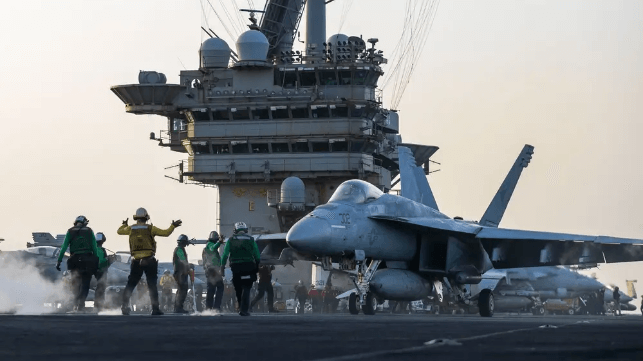U.S. Suspends Bombing Over Yemen After New "Ceasefire" With Houthis

The Trump administration has decided to implement a mutual ceasefire with Yemen's Houthi rebels, President Donald Trump announced in a press conference Tuesday. He said that U.S. bombing runs over Yemen would cease "effective immediately," and that he would take the Houthis "at their word" that they would cease attacking American shipping.
According to the Sultanate of Oman, which brokered the reported agreement, "neither side will target the other, including American vessels, in the Red Sea and Bab al-Mandab Strait, ensuring freedom of navigation and the smooth flow of international commercial shipping."
This appears to return relations between the Houthis and the U.S. to the state that existed in January, when a U.S.-brokered ceasefire in Gaza prompted the Houthi leadership to halt attacks on most shipping.
The Israeli government was not informed of the U.S.-Houthi detente ahead of Trump's announcement, according to The Jerusalem Post's Amichai Stein.
After Trump's statement, official Houthi outlets pledged to continue missile attacks on Israeli territory.
It remains unclear whether the new ceasefire also ensures the safety of non-American shipping in the Red Sea, including Israeli-linked shipping. A State Department spokesperson declined to clarify, and referred reporters back to the president's remarks.
Mohammed Ali al Houthi, one member of the Houthi leadership council, has cast doubt on whether the arrangement is final. In a statement on X, he said that the group would evaluate an American proposal "on the ground" before making any formal agreements. Trump described the arrangement not as a deal, but a "capitulation" - a Houthi proposal to give up attacks on shipping in exchange for an end to U.S. bombing.
The effects of combined U.S. and Israeli airstrikes would have given the Houthi leadership a powerful incentive to reach a compromise agreement. American forces have hit Houthi command posts and weapons sites "around the clock" since March 15, and two carriers have been deployed in the Red Sea to ensure a high tempo of bombing runs. Since last weekend, Israeli forces have launched mass attacks on dual-use targets in Houthi areas, destroying the airport in the group's capital of Sana'a, the seaport at Hodeidah and several cement factories. The ceasefire announcement followed just hours after the latest Israeli raid.
Possible guidance improvements in the Houthis' Iranian-supplied missile inventory may also have made the group more dangerous to U.S. military assets in recent weeks. Satellite imagery suggests that at least one U.S. Navy carrier off Yemen was forced to make unusual high-speed evasive maneuvers in late April, and the Navy has confirmed the loss of an F/A-18 strike fighter over the side of USS Harry S. Truman during a hard turn; the crew got out of the way before it went over, but one crewmember was injured.
After the ceasefire announcement, analysts' attention has quickly turned to the Houthis' Iranian sponsors - and the question of whether the truce would be durable.
"If this sticks, the Houthis and Iran will use the quiet to rebuild Houthi capabilities in Yemen and try to create the illusion that Tehran is de-escalating amid U.S.-Iran talks when it's a tactical pause to survive," said United Against a Nuclear Iran's Jason Brodsky. "Recall after Israel struck Iranian soil last year, the regime pushed Hezbollah into a ceasefire to not only buy quiet to rearm, but to avoid further damage to Iranian interests."
